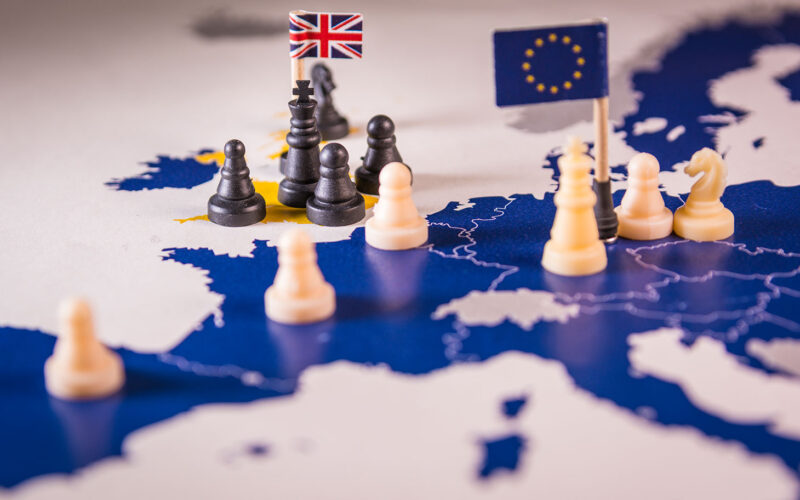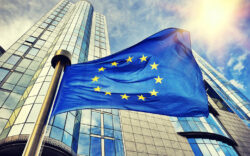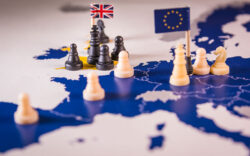In today’s issue:
- A Russian submarine spotted off the coast of Scotland?
- The cable cutting and splicing industry is big business
- Just another reason to go nuclear
Back in 2018, then President Donald Trump warned Germany of energy dependence on Russia. He was ridiculed by the audience – the United Nations.
But just three years later, the Germans came knocking for American gas at any price. Russia had invaded Ukraine. And so the Germans had to pay up, big time.
It was a big enough opportunity to knock even President Biden out of his green dream delusions. He sold them the gas they needed. And turned America into a gas-exporting superpower.
Trump’s warnings were about Nord Stream 2 specifically, which would only add to Germany’s Russian gas reliance. It would also bypass the gas flowing through Ukraine, allowing the Russians to cause more trouble there.
Nord Stream 2 was sabotaged a year after the energy crisis began. There still isn’t much consensus on who did it.
It was an extraordinary sequence of events. I still don’t quite know how to piece them together coherently into one narrative for you. As you probably know, I don’t mind being called a conspiracy theorist. But I can’t get all the ducks to align into one story.
What I do know is that the Germans ended up having to spend almost as much on energy crisis policies as the pandemic! And the global energy crisis had all sorts of consequences beyond Europe’s so called “borders”. Not to mention the war itself. You could even blame former Chancellor Angela Merkel for the second wave of refugees, this time driven by the cost of energy.
My question today is whether the Western world is making much the same mistake again. In a surprisingly similar way, too. Are we setting ourselves up for a sub-sea energy war that may already have begun to bubble below the surface, as the conflict in Ukraine did many years before it officially began?
I’m going to call it a “submarine energy war”, because that sounds exciting. But I’m really just talking about the sort of attack that was made on the sub-sea Nord Stream 2 pipeline. What if it isn’t the last energy superhighway beneath the waves that gets cut?
Renewable energy systems rely on sub-sea cables
The energy transition requires enough high-voltage cables to make an AC/DC tribute band nervous. Many of these cables are interconnectors between countries and different parts of the UK. Not to mention connecting offshore wind farms. They are often submarine cables to avoid using up land, just as Nord Stream was submerged.
A few years ago, I saw a summary of the subsea cables planned for the UK. I think they were mostly high voltage direct current (HVDC) – designed to move power from Scotland’s wind farms to southern England’s unspoiled vistas.
My worry is obvious, right? If we are transitioning to an energy system that relies on subsea cables, and they can be cut with impunity, are we making the same mistake as the Germans were in 2018?
This is of course terribly conspiratorial. Nord Stream 2 was just an exception. It’s not like submarine cables are being clandestinely cut around the world.
Well, funny you should mention that…
In 2022, High North News reported this:
The sabotage of the Nord Stream 1 and 2 pipelines in the Baltic Sea earlier this week may shed new light on two recent incidents in the Norwegian Arctic involving the cutting of communication cables.
BBC News in March:
Several undersea communications cables in the Red Sea have been cut, affecting 25% of data traffic flowing between Asia and Europe, a telecoms company and a US official say.
Bloomberg has published a new long-winded piece of mystery journalism about a “12-ton section of cable” that went “missing” off the coast of Norway. It took them ages to figure out what had gone wrong, because checking in on a sub-sea cable is mighty expensive and difficult, even for the Norwegians.
The snip list goes on. Mostly, it’s telecoms cables that get cut. The Internet Society Pulse: “According to the United Nations, 150 to 200 subsea cable faults occur annually. Fishing and shipping activities account for nearly two-thirds of the total.”
So there’s practically an industry in fixing cut subsea cables…
It’s enough to make Bloomberg ask, “Is Russia Waging War Under the Seas?” in a new video. Apparently, analysts allege “a wider pattern of Russian sabotage.”
Why the Russians would sabotage their ability to interfere in other people’s elections is a mystery.
Seriously though, it’s not like the Russians have their submarines patrolling over our future subsea cables, right?
The Daily Mail last month: “Security alert after Russian nuclear submarine spotted off Scotland’s coast.”
If someone can get away with damaging Nord Stream, I’m guessing they can get away with damaging subsea power cables. And if this seems to happen all the time without mysteries being solved, I suspect they can get away with it twice over.
Not that countries trying to engage in energy war do the dirty work themselves. The Houthis are busy driving drone boats into oil tankers, for example…
Energy wars on the high seas seems downright fashionable these days!
Energy security has many meanings
The issue here is the same one we’ve been highlighting for years now. And in all sorts of different ways.
The energy infrastructure needed to make renewables look viable undermines their viability. You can now add energy security, in the geopolitical sense, to the long list.
Because renewables need long cables to move energy about, those cables create a dangerous new vulnerability. We’ve already learned this the hard way from nature.
In August 2019, the UK experienced its worst blackout in a decade. Parts of France went into rolling blackouts in January 2019. Both times, it was because the frequency on the vast grid went too low. Just the sort of thing which disrupting the electricity grid would cause.
If the Russians, or anyone else for that matter, can cut our heat pumps from the safety of their nuclear submarines and get away with it, do we really want to go renewable?
It would bring a whole new meaning to the idea of a Cold War with Russia…
You may laugh. But so did the German delegation at the UN when Trump warned them.
Energy security means minimising point of failure
Nuclear power minimises the need to build out vast transmission networks, vast energy storage networks and power stations in the middle of nowhere. It could actually make the country safer from foreign threats by making the grid harder to reach and more robust.
So, if you think Trump was onto something in 2018, but missed the opportunity to invest in gas, you may yet have a chance to profit from Europe’s latest energy folly.
Until next time,

Nick Hubble
Editor, Fortune & Freedom



